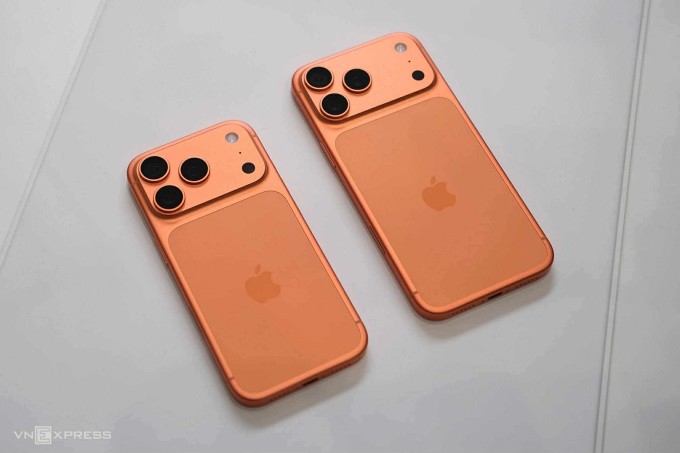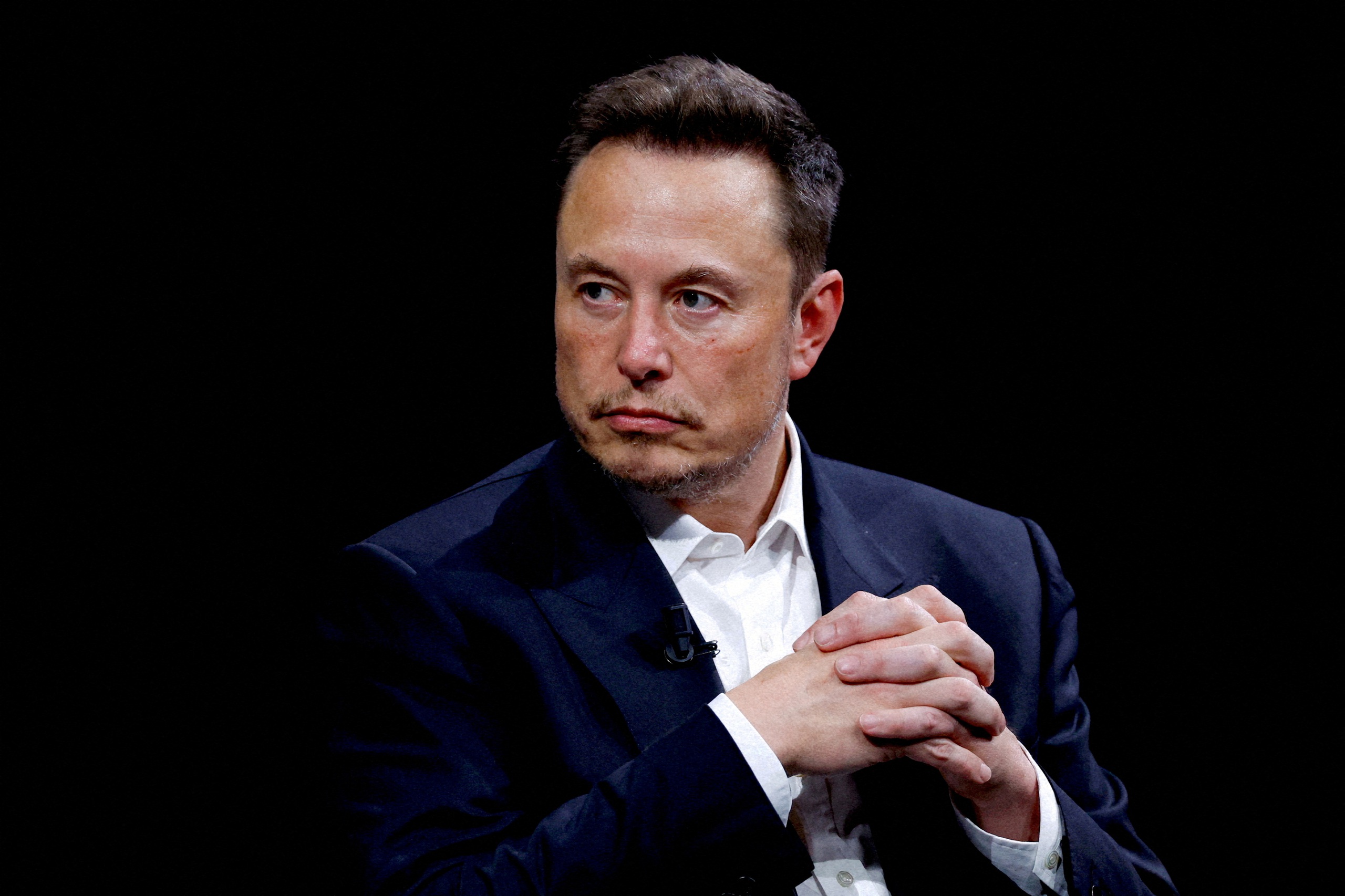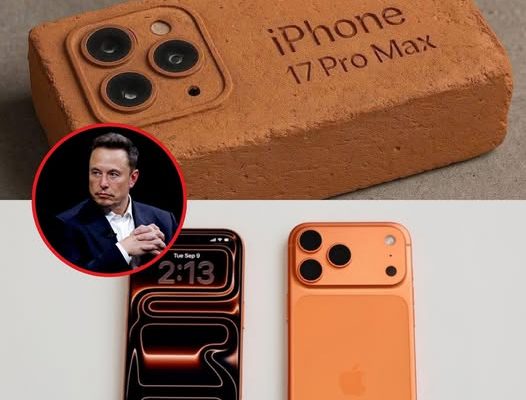SHOCKING: Elon Musk Calls iPhone 17 a “Mobile Brick” – Public Opinion Explodes
A Tech Titan’s Unexpected Blow
In an era where every new iPhone release is treated almost like a global holiday, few could have predicted the storm that erupted when Elon Musk, the outspoken tech billionaire and CEO of Tesla and SpaceX, dismissed Apple’s latest flagship smartphone with a scathing remark.
Speaking during a live-streamed Q&A session at Tesla’s Palo Alto headquarters, Musk casually referred to the newly launched iPhone 17 as nothing more than a “mobile brick.” His words spread across the internet like wildfire, sparking debate, memes, fury, and even unexpected praise.
What made Musk’s blunt critique all the more explosive was not just what he said, but the reasoning behind it — and the deeper technological and philosophical issues he tied to Apple’s newest device.
Why Musk Called It a “Mobile Brick”
When pressed to elaborate, Musk explained that while the iPhone 17 is packed with cutting-edge features, it has “lost its soul as a tool for innovation” and has instead become a status object that offers diminishing returns in utility.

He listed three main reasons:
-
Bulky Hardware With Minimal Gains
Musk claimed that the iPhone 17’s redesigned casing, though praised by Apple as a leap in durability and battery life, has made the device heavier and less ergonomic.“You’re essentially carrying a brick in your pocket,” Musk said. “A very expensive one, wrapped in titanium.”
-
Closed Ecosystem
Musk criticized Apple’s insistence on walling off its ecosystem. According to him, the iPhone 17 doubles down on proprietary connectors, limited cross-compatibility, and tightly controlled app policies.“A brick doesn’t connect to much,” he quipped. “And neither does an iPhone 17 unless it’s in Apple’s walled garden.”
-
Artificial Intelligence Shortcomings
The billionaire further argued that while Apple touted its AI integration with “Siri Neo” — the company’s latest digital assistant upgrade — it lagged far behind open models.“If you’re going to claim to be the future of mobile intelligence, then don’t deliver an assistant that can’t even draft a useful email,” Musk said, comparing it unfavorably to his own xAI’s Grok assistant.
Public Reaction: Praise, Outrage, and Memes
The reaction from the public was immediate and chaotic. Within minutes of Musk’s comment, hashtags like #MobileBrick, #iBrick17, and #MuskVsApple trended across X (formerly Twitter).
-
Apple Loyalists were outraged, calling Musk’s remarks disrespectful and inaccurate. Many pointed out that early reviews praised the iPhone 17’s extended battery life and new holographic display features.
-
Musk Supporters applauded him for speaking out against what they saw as Apple’s complacency. They argued that the iPhone has indeed become a fashion item rather than a truly groundbreaking piece of technology.
-
The Meme Industry went into overdrive. Within hours, photoshopped images of construction workers using iPhone 17s as bricks for houses flooded social media. One viral post showed a Tesla Cybertruck being repaired with iPhones stacked like steel plates.
Market Repercussions
Musk’s remark had real-world consequences. Apple’s stock briefly dipped by nearly 2% in after-hours trading, wiping out billions in market capitalization before stabilizing.
Financial analysts were quick to debate whether Musk’s words alone could sway investor confidence or if underlying concerns about the iPhone 17’s sales performance were already brewing.
Meanwhile, Tesla shares ticked upward, as retail investors celebrated Musk’s audacity. Some speculated that his critique was part of a larger strategy to push Tesla’s own rumored smartphone project, the “Tesla Pi.”
Apple’s Response
Apple, usually tight-lipped in the face of criticism, issued a rare and swift statement. A spokesperson said:
“The iPhone 17 is the most advanced smartphone in history, featuring breakthroughs in holographic display, quantum-grade security, and battery efficiency. Any claims dismissing its innovation are simply unfounded.”
Tim Cook, Apple’s CEO, has not personally commented yet, but insiders say he views Musk’s attack as “attention-seeking behavior” rather than substantive criticism.
A Deeper Tech Rivalry
The rivalry between Musk and Apple is not new. Over the years, Musk has repeatedly taken shots at the Cupertino giant:
-
In 2022, he accused Apple of threatening to remove Twitter from the App Store during his early days of acquiring the platform.
-
In 2024, he mocked Apple’s “VisionPro” headset, calling it “a $3,500 face TV.”
-
Most recently, rumors have circulated that Tesla’s hardware division is quietly developing a smartphone to rival Apple and Samsung.
Musk’s “Mobile Brick” jab may therefore be more than just commentary — it could be part of a calculated move to position himself as a challenger in the smartphone industry.
The Philosophy Behind Musk’s Words
Beyond the insult, Musk’s critique highlighted a larger debate about the future of personal technology.
He argued that modern smartphones, including the iPhone 17, are “maxed-out rectangles” that fail to push humanity forward. Instead, he emphasized that the real frontier lies in neural interfaces, AI-native devices, and direct integration with human cognition.
“Why are we still obsessed with phones in our pockets,” Musk asked, “when the real leap will come from devices that merge with our minds?”
This aligns with his work at Neuralink, where brain-computer interface testing is already underway in limited human trials.
Experts Weigh In

Tech analysts and academics rushed to weigh in on Musk’s comments.
-
Dr. Maria Sanchez, professor of digital innovation at Stanford, said Musk’s critique of Apple’s ecosystem is valid:
“Apple has mastered customer loyalty by closing doors rather than opening them. The iPhone 17 doubles down on that strategy, which frustrates competitors like Musk who champion openness.”
-
Daniel Cho, a market analyst at Wedbush Securities, warned that Musk’s rhetoric could hurt Apple in the short term but might not dent long-term sales:
“The average Apple user is deeply entrenched. Calling it a brick may spark laughs, but it won’t stop lines from forming outside Apple Stores.”
-
Lydia Grant, an AI researcher, argued that Musk’s point on AI stagnation is worth considering:
“Apple has indeed lagged behind in AI. Siri Neo is better, but still behind open assistants. If smartphones are to remain relevant, intelligence will be the battlefield.”
Social Divide: Tech Elitism vs. Everyday Use
Interestingly, Musk’s comment also exposed a social divide. While tech elites debated AI capabilities and open ecosystems, everyday users pointed out that the iPhone 17’s longer battery life and improved durability solved their real-world problems.
One viral X post read:
“Elon Musk wants a phone that merges with your brain. I just want one that lasts more than a day without charging. iPhone 17 delivers that. Call me a bricklayer then.”
Could Tesla Enter the Smartphone Wars?
The biggest question following Musk’s statement is whether Tesla will finally enter the smartphone market.
For years, speculation about a “Tesla Pi Phone” has circulated, fueled by leaks, concept designs, and unconfirmed patents. If Musk does plan to release a competitor, calling the iPhone 17 a “brick” could be the opening shot in a new Silicon Valley arms race.
Industry insiders suggest Tesla could integrate its phone with Starlink satellites, Tesla vehicles, and Grok AI — offering features Apple cannot match.
Conclusion: A War of Ideas, Not Just Devices
Elon Musk’s dismissal of the iPhone 17 as a “mobile brick” may sound like a throwaway insult, but it has ignited a fiery global debate.
At its core, the controversy is not just about a phone. It is about competing visions of the future:
-
Apple’s incremental refinement of a luxury product versus
-
Musk’s dream of revolutionary leaps in human-technology integration.
Whether Musk’s critique will dent Apple’s dominance remains to be seen. For now, though, one thing is certain: the battle for the next era of personal technology is only just beginning — and the world will be watching every brick thrown.



